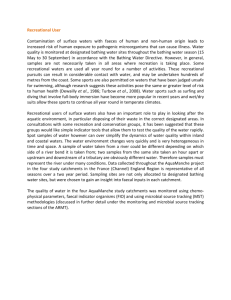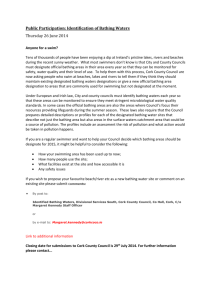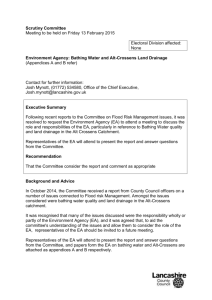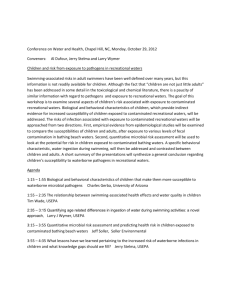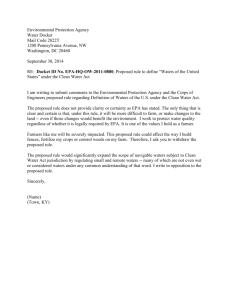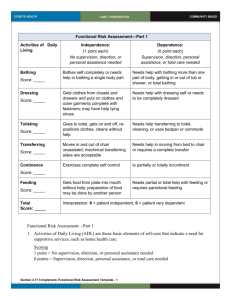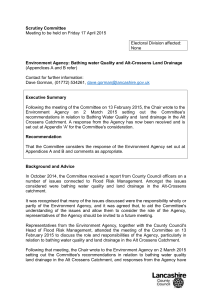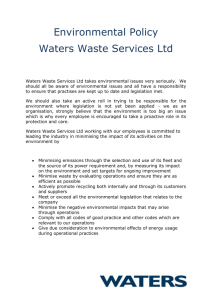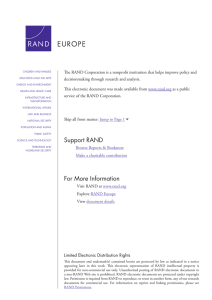Question 1: Bearing in mind the cost and benefit implications, do you
advertisement
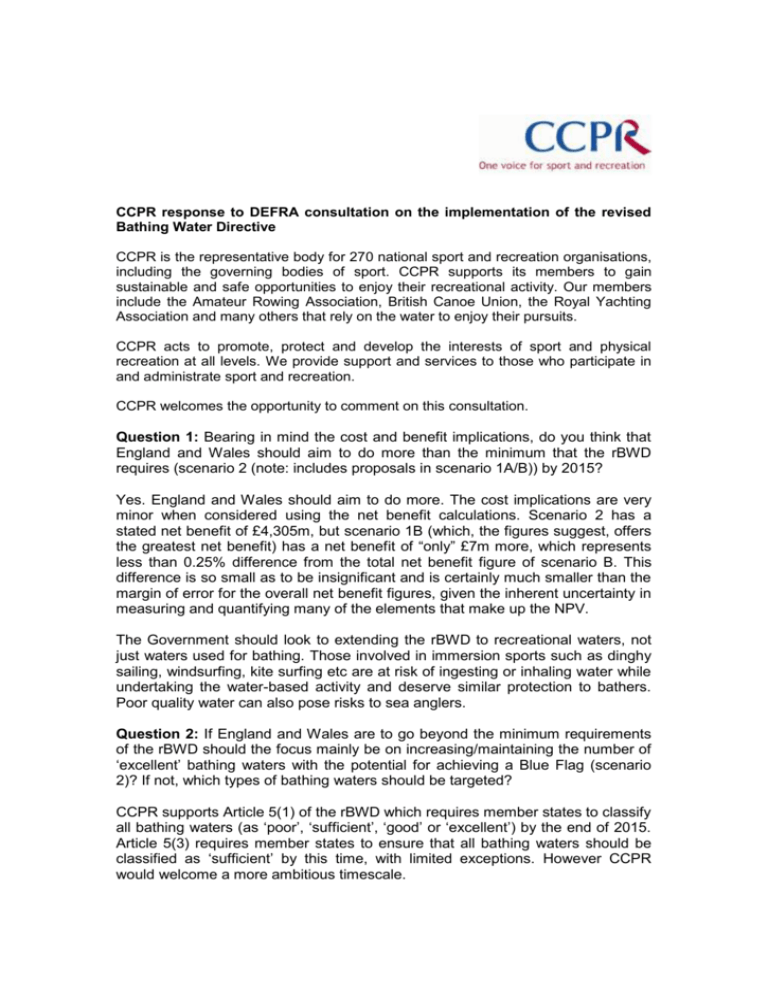
CCPR response to DEFRA consultation on the implementation of the revised Bathing Water Directive CCPR is the representative body for 270 national sport and recreation organisations, including the governing bodies of sport. CCPR supports its members to gain sustainable and safe opportunities to enjoy their recreational activity. Our members include the Amateur Rowing Association, British Canoe Union, the Royal Yachting Association and many others that rely on the water to enjoy their pursuits. CCPR acts to promote, protect and develop the interests of sport and physical recreation at all levels. We provide support and services to those who participate in and administrate sport and recreation. CCPR welcomes the opportunity to comment on this consultation. Question 1: Bearing in mind the cost and benefit implications, do you think that England and Wales should aim to do more than the minimum that the rBWD requires (scenario 2 (note: includes proposals in scenario 1A/B)) by 2015? Yes. England and Wales should aim to do more. The cost implications are very minor when considered using the net benefit calculations. Scenario 2 has a stated net benefit of £4,305m, but scenario 1B (which, the figures suggest, offers the greatest net benefit) has a net benefit of “only” £7m more, which represents less than 0.25% difference from the total net benefit figure of scenario B. This difference is so small as to be insignificant and is certainly much smaller than the margin of error for the overall net benefit figures, given the inherent uncertainty in measuring and quantifying many of the elements that make up the NPV. The Government should look to extending the rBWD to recreational waters, not just waters used for bathing. Those involved in immersion sports such as dinghy sailing, windsurfing, kite surfing etc are at risk of ingesting or inhaling water while undertaking the water-based activity and deserve similar protection to bathers. Poor quality water can also pose risks to sea anglers. Question 2: If England and Wales are to go beyond the minimum requirements of the rBWD should the focus mainly be on increasing/maintaining the number of ‘excellent’ bathing waters with the potential for achieving a Blue Flag (scenario 2)? If not, which types of bathing waters should be targeted? CCPR supports Article 5(1) of the rBWD which requires member states to classify all bathing waters (as ‘poor’, ‘sufficient’, ‘good’ or ‘excellent’) by the end of 2015. Article 5(3) requires member states to ensure that all bathing waters should be classified as ‘sufficient’ by this time, with limited exceptions. However CCPR would welcome a more ambitious timescale. We support all efforts to improve the quality of England and Wales’s inland and coastal waterways. This should not be limited only to those already classified as excellent. Resources should instead be targeted on areas which receive the greatest use of all water sports users, such as canoeists, boaters, surfers and anglers as well as bathers. This test of “utility” for water sports users in the round, rather than blindly building on current successes, should be used as the basis of targeting resources. The Blue Flag is an important brand and which should receive continued support and engagement. The emphasis should be on achieving ‘good’ water status for both bathing and recreational waters. Question 3: Should the Government and the Environment Agency continue the development of the prediction and discounting system with a view to using it at a limited number of bathing waters to help achieve the minimum standards required by the rBWD (scenario 1B) by 2015? The development of the prediction and discounting system helps to provide an accurate picture of the long term quality of bathing water. The points made in 1.56 are very important. “Discounting should not…be seen as a way of avoiding taking measures to improve bathing water quality., but instead as an option where measures have been taken and continue to be takes….” This should be monitored on an ongoing basis. Where there is a continued need for the discounting system to be applied in particular areas, and the trend of its application is either constant or upward, this should provide strong evidence for the need to invest in improving measure to reduce water pollution, both direct and diffuse. Question 4: If the prediction and discounting system can be used to help meet the minimum requirements of the rBWD, who should help meet these costs? (please list those who should be expected to help fund the system) Adequately funded local authorities should be responsible for meeting some of the costs, but the majority should be met by those responsible for creating the pollution, such as water companies or industry. Those who benefit from the cleaner waters such as marina owners, or tourist-related businesses might also make a contribution proportionate to the size of their business, to the cost. The level of such a fee should not be exclusive, nor act as a deterrent to current and aspirant recreational users. Question 5: If the prediction and discounting system can be used to enable a bathing water to obtain a higher than ‘sufficient’ classification, for example, to achieve the classification needed for a Blue Flag award, who should help meet these costs? (please list those who should be expected to help fund the system) As above. Question 6: Do you agree that by 2012 the vast majority of beach operators will have included the bathing water quality information on their beach signage, for example, during routine sign replacement and updating, at minimal cost? If not, why not? (Beach operators - could you please list the bathing waters you control and indicate whether your bathing waters currently have beach signage). Yes. Due consideration must be given providing information online as well as in situ. Proper maintenance must be in place to ensure that telephone numbers/web sites are up to date, signs remain legible and the effects of vandalism are mitigated. Question 7: Do you support our proposals to develop the information on signs to provide bathers with advice to help them avoid bathing during ‘poor’ water quality? If not, why not? Yes, but it is very important that a ‘poor’ water quality classification is not used as a reason to close beaches and waterways to other water users such as canoeists, sailors etc. Except under rare and extreme conditions, individuals, furnished with accurate, up to the date and readily available information on water quality should be free to decide on whether to participate in water sports. Recreational users should be fully represented on any DEFRA group or fora that plans or manages such signage. Question 8: Are you content with the Government’s proposal not to consult again on amendments which will need to be made to the Regulations post March 2010, which will require local authorities and private controllers to use the signs or symbols proposed by the Commission and adopted by the EU through the Directive’s committee procedure? If not, why not? Yes CCPR is content that there would not be consultation on this issue and welcomes consistency with signage across England and Wales. Question 9: The Government’s proposals assume that the rBWD will apply to the existing list of bathing waters. Do you think that any waters need to be added to, or removed from the current list of bathing waters? If yes, please give reasons. CCPR believes that all recreational water and not just bathing waters should be covered by the rBWD. Recreational use of waters provides enormous benefits to the economy and national health. Improvements in water quality will serve to enhance these benefits.
